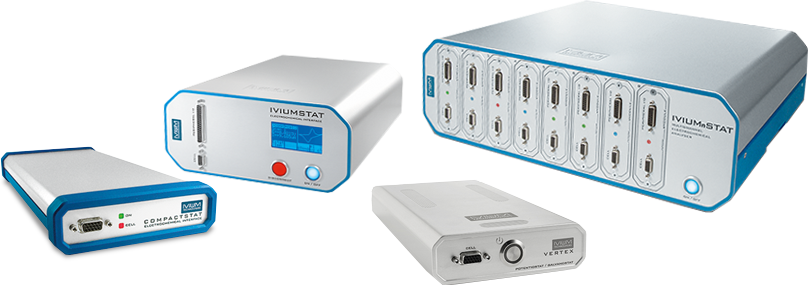
In this article, we will discuss the following topics:
Introduction to the EIS Analyzer (Basics)
How to set up a measurement
Electrochemical impedance spectroscopy with Ivium
Electrochemical impedance spectroscopy (EIS) is a widely used technique in electrochemical research. It is a non-destructive method for studying the electrical properties of a system under different conditions. For example, EIS measurements can be used to determine the resistance and capacitance of the system, as well as its diffusion and reaction kinetics. This information can be used to gain insight into the behavior of the system and to develop new electrochemical materials and processes.
EIS measurements are often performed using an EIS analyzer or a potentiostat with EIS capability. The potentiostat or galvanostat is capable of applying the sinusoidal voltage or current signal, and a frequency response analyzer (FRA) is used to measure the current or voltage response over a range of frequencies.
The EIS measurement is setup in IviumSoft software. Depending on the requirements of the measurement four different impedance methods can be selected. Read our application note for setting up an electrochemical impedance spectroscopy measurement in IviumSoft software. Four different impedance methods can be selected:
Constant E
Constant I
PotentialScan
CurrentScan
Each method has two modes:
Basic
Advanced
If you’re looking to carry out precise and comprehensive electrochemical impedance spectroscopy (EIS) measurements, you need a high-quality instrument capable of EIS. One of the main advantages of the EIS capability in an Ivium instrument is its seamless integration with IviumSoft software, allowing for the utilization of four distinct impedance methods to meet specific measurement requirements. Constant E, Constant I, PotentialScan, or CurrentScan may be selected, each of which confers unique benefits to yield the most comprehensive and accurate measurement results.
The EIS methods in Iviumsoft also feature an Advanced mode with additional parameters that enable you to customize the settings for Equilibration time, Noise, Filter, and Stability. The system automatically determines the most appropriate settings based on the applied frequency, but you can also override them to achieve specific results. With the wide range of features in Iviumsoft for EIS, you can take your EIS measurements to the next level and get the insights you need to make informed decisions.
Additionally, the EIS methods in Iviumsoft feature an Advanced mode equipped with supplementary parameters that allow for further customization of settings such as Equilibration Time, Noise, Filter, and Stability. While the system automatically determines the most suitable settings based on the applied frequency, users may also override these settings to achieve specific outcomes. By utilizing the range of features in Iviumsoft for EIS, one may elevate their EIS measurements to the next level, gaining the valuable insights required to make informed decisions.
Are you unsure about which type of instrument you need for conducting EIS measurements? Our team at Ivium is here to help. With our expertise in electrochemical impedance spectroscopy, we can guide you in choosing the right instrument for your specific research needs. Contact us today for personalized assistance and discover how Ivium can enhance your EIS measurements.